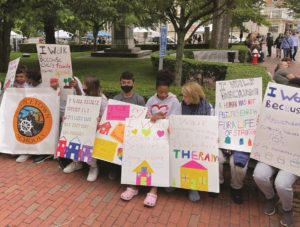EASTHAM — Allie Dubois and her family had been renting their house in Eastham for almost four years when their landlord decided to take advantage of the booming real estate market and sell. Since getting this news in May, she’s searched for a new place to live every day, to no avail.
After all her searching, Dubois said, “I have not found one acceptable place for my family to live.” She said there’s not one house selling for less than $500,000, and the lowest rent she’s been able to find is $2,000 per month. “That could be a mortgage,” she said. “It’s a constant, crippling undercurrent of anxiety. I can never not think about it.”
Dubois, who lives with her husband and 14-year-old son, has lived on the Cape for over a decade. She has what she calls a “Cape Cod career,” working as a waitress, seamstress, landscaper, and, prior to the pandemic, after-school art teacher. It’s always been hard to find housing here, she said. It took the family eight months to find their Eastham rental four years ago. Today, said Dubois, the task seems impossible.
Hadley Luddy, CEO of the Homeless Prevention Council (HPC), a Cape organization that provides case management and rental assistance to people experiencing homelessness and housing insecurity, said her office is hearing more and more stories like Dubois’s.
In the first three months of 2021 alone, HPC served the same number of people as it did in the last six months of 2020. And 2020 was already a year of unprecedented need, with HPC cases up 25 percent from 2019, Luddy told the Independent in June.
Luddy has had to tell a growing number of clients that there are simply no available rentals. “It’s really difficult for a case management team to have no solutions,” she said.
If year-round housing continues to disappear at its present rate, Luddy said the situation “will get worse, to the point where we don’t have a workforce at all to draw from.”

The owner of Dubois’s rental house has found a buyer, with the closing date set for Sept. 20. Dubois has hired a lawyer in an effort to delay their ultimate departure by a few months. By then, Dubois hopes to have found a new spot, but based on how the search has gone so far, that might be easier said than done.
Tina Camino, who has lived in Provincetown since 2003, had been renting from a friend for nearly a year when she was forced to leave on June 16 because the house was sold. Camino was without housing for nearly two months, staying with friends for short periods and spending time with her ill father in Pennsylvania. She moved into an apartment on Shank Painter Road last week.
Camino last had stable housing in 2018. She was in the same apartment, which she rented from a friend and his husband, for four years. Camino left the apartment because of a pervasive mold problem. The mold made her sick, she said, but she hesitated to raise the issue with the owner because she feared she would be kicked out. After she did raise the issue to the owner and he downplayed it, she decided she needed to stay somewhere else until the mold problem was fixed. The owner told her not to come back.
“You’re living in a place where you’re scared to tell the landlord what’s going on because of the housing crisis,” she said. “I was always afraid that something was going to happen.”
The situation has gotten noticeably worse since Camino moved to Provincetown nearly two decades ago, she said. Back then, it was much easier to find housing for the winter and summer. The change is frustrating to Camino, and, she said, the people who will suffer most are the workers.
“It’s almost like no one cares,” Camino said. Summer people “want to be here and be served,” she said, but she wonders what will happen when there’s no one to serve them “because the workers have nowhere to stay.”
Dubois agreed with Camino: “What are the haves going to do when there’s no more have-nots?”



